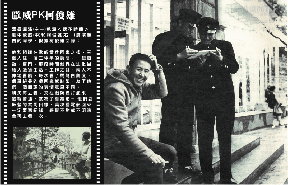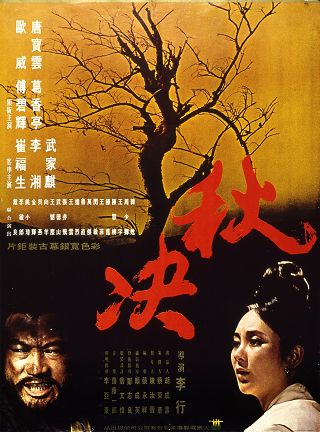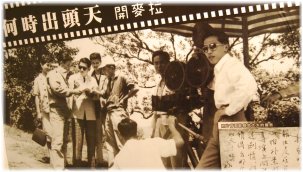Tough movie careerIn 1956, Ou Wei began to recommend himself to the movie studio. After one year, he finally got his first role —an inferior aborigine, Ou Wei, who fought Japanese policemen in defense of his country in the film “ Lush Mountain & Royal Blood --The Wushe Events ", which was also his first movie. Consequently, he obtained Director Ho’s permission, using “Ou Wei” as his permanent screen name. |
Ou Wei's days in Hwa Sin Studio |
||
| Initially, he improved his acting at Hwa Sin Studio, during which all he joined were Taiwanese movies. In 1958, he received a notice, informing him of his military service. Would the foundation he had built tenaciously for his career go back to nothing because of this vacancy? The one he shot right before the service was the film When Could I Succeed, the name of which resonated profoundly his feelings at the moment. | |||
During this period, Ou Wei also took part in seven Taiwanese films. Nevertheless, it was a pity that Taiwanese films became less prosperous after he left the army; the movie studio which had sponsored him went bankrupt as well. Before this happened, he had a chance to connect to Director Pan Lei, who had considered Ou Wei a potential actor when watching his performance in Jin Shan Law Case. Since that, he had encouraged Ou Wei to continue acting even when he was still under the military service. After the service, Ou Wei was invited to join the film Typhoon, directed and edited by Pan Lei for Central Motion Picture Company, which began his participance in the Chinese-language movies. |

Director Pan Lei (left), Ou Wei (middle) and Ko Jun Xiong (right) |
||
| Later, Ou Wei signed a continual contract for years with Director Pan, who also invited Ou Wei to act in Hong Kong. However, either because Ou Wei wasn’t interested or because he didn’t think the trendy love stories fit his style, he ceased the contract when it expired. | |||
| Then, under the recommendation of Director Li Cha, he joined Director Li Hsing’s first film for China Motion Picture Company, Oyster Girl, which won him the Most Promoting Actor—the Golden Knight Award bestowed by American Individual Film Association in Asia Film Exhibit. Again, his distinguished performance contributed to a one-more-year contract with China Motion Picture Company. This movie connected him to Director Li Hsing, but their official cooperation began through the reality-depicting classic Beautiful Ducking, in which they both built strong mutual trust. The film won Ou Wei the Best Leading Actor in Asia Film Exhibit—an international recognition. |
|||
| Execution in Autumn, an important work in the Taiwan movie history, took Director Li several years to conceive and prepare. In the film, some issues were discussed such as Chinese traditional culture, life prospect, ethics and different ways to present movie art. Ou Wei knew very well that the director expected highly from the film, so he was willing to wait patiently for the opportunity to join the movie, which he ultimately achieved.The film’s publication gained well-rounded recognition and admiration, wrapping up numerous rewards: the Best Film, Best Director, Best Leading Actor, and Best Leading Actress in the Golden Horse Film Awards. |

Execution in Autumn |
||
| “It is really difficult for an actor to make a film meeting the expectations of both spectators and actors, but I feel honored and appreciate the chance to take part in a movie like Execution in Autumn, even though there was only once in my lifetime.” | |||
Journey to the star
Ups and downs
“Ten years! I plan to give myself ten years to work on movies. After that, if I still can't do well, I’ll go back to the countryside and grow rice; by no means will I do anything about movies again!”
~Ou Wei
